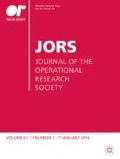Abstract
Stochastic perturbation methods can be applied to problems for which either the objective function is represented analytically, or the objective function is the result of a simulation experiment. The Simultaneous Perturbation Stochastic Approximation (SPSA) method has the advantage over similar methods of requiring only two measurements at each iteration of the search. This feature makes SPSA attractive for robust parameter design (RPD) problems where some factors affect the variance of the response(s) of interest. In this paper, the feasibility of SPSA as a RPD optimizer is presented, first when the objective function is known, and then when the objective function is estimated by means of a discrete-event simulation.







Similar content being viewed by others
References
Benjamin P and Erraguntla M (1995). Using simulation for robust system design . Simulation 65: 116–128.
Beyer H and Sendhoff B (2007). Robust optimization—A comprehensive survey . Comput Method Appl M 196: 3190–3218.
Chin D (1997). Comparative study of stochastic algorithms for system optimization based on gradient approximations . IEEE T Syst Man CYB 27: pp. 244–249.
Cupertino F, Mininno E, Naso D and Turchiano B (2006). An experimental implementation of SPSA algorithms for induction motor adaptive control. IEEE Mountain Workshop on Adaptive and Learning Systems.
Del Castillo E (2007). Process Optimization: A Statistical Approach . Springer: New York, NY.
Elsayed EA and Boucher TO (1985). Analysis and Control of Production Systems . Prentice-Hall: Englewood Cliffs, NJ.
Fu M and Hill S (1997). Optimization of discrete event systems via simultaneous perturbation stochastic approximation . IEEE Trans 29: 233–243.
Gerencsér L (1998). SPSA with state-dependent noise—A tool for direct adaptive control. In: Proceedings of the 37th IEEE Conference on Decision and Control, Vol. 3, Tampa, FL, pp. 3451–3456.
Hill S, Gerencsér L and Vágó Z (2004). Stochastic approximation on discrete sets using simultaneous difference approximations. In: Proceedings of the 2004 American Control Conference, Vol. 3, Laurel, MD, pp. 2795–2798.
Ho YC, Cassandras CG, Chen CH and Dai L (2000). Ordinal optimisation and simulation . J Opl Res Soc 51: 490–500.
Hurrion R (1997). An example of simulation optimisation using a neural network metamodel: Finding the optimum number of kanbans in a manufacturing system . J Opl Res Soc 48: 1105–1112.
Hutchison D (2002). On an efficient distribution of perturbations for simulation optimization using simultaneous perturbation stochastic approximation. In: Proceedings of the IASTED International Conference Applied Modeling and Simulation, Cambridge, MA, pp. 440–445.
Ittiwattana W (2002). A method for simulation optimization with applications in robust process design and locating supply chain operations. PhD dissertation. The Ohio State University.
Kleijnen J, Bettonvil B and Persson J (2003). Robust solutions for supply chain management: Simulation, optimization, and risk analysis, http://center.uvt.nl/staff/kleijnen.
Kocsis L and Szepesvári C (2006). Universal parameter optimisation in games based on SPSA . Mach Learn 63: 249–286.
Mayer RJ and Benjamin P (1992). Using the taguchi paradigm for manufacturing system design using simulation experiments . Comput Ind Eng 22: 195–209.
Miranda AK (2008). Stochastic perturbation methods for robust optimization of simulation experiments. MS thesis. The Pennsylvania State University.
Moré J, Garbow B and Hillstrom K (1981). Testing unconstrained optimization software . ACM T Math Software 7: 17–41.
Myers RH and Montgomery DC (2002). Response Surface Methodology Process and Product Optimization Using Designed Experiments . Wiley-Interscience: New York, NY.
Rezayat F (1994). On the use of SPSA-based model-free controller in quality improvement. In: Proceedings of the 33rd Conference on Decision and Control, Vol. 2, Lake Buena Vista, FL, pp. 1876–1878.
Sadegh P (1997). Constrained optimization via stochastic approximation with a simultaneous perturbation gradient approximation . Automatica 33: 889–892.
Schwartz J, Wang W and Rivera D (2006). Simulation-based optimization of process control policies for inventory management in supply chains . Automatica 42: 1311–1320.
Sohn SY (2002). Robust design of server capability in M/M/1 queues with both partly random arrival and service rates . Comput Opns Res 29: 433–440.
Spall J (1992). Multivariate stochastic approximation using a simultaneous perturbation gradient approximation . IEEE T Automat Contr 37: 332–341.
Spall J (2003). Introduction to Stochastic Search and Optimization . Wiley-Interscience: New York, NY.
Spall J and Cristion J (1997). A neural network controller for systems with unmodeled dynamics with applications to wastewater treatment . IEEE T Syst Man CYB 27: pp. 369–375.
Wang L (2006). Augumented simultaneous perturbation stochastic approximation (Aspsa) for discrete supply chain inventory optimization problems. PhD dissertation. The Pennsylvania State University.
Wild R and Pignatiello J (1991). An experimental design strategy for designing robust systems using discrete-event simulation . Simulation 57: 358–368.
Yeomans J (2002). Automatic generation of efficient policy alternatives via simulation-optimization . J Opl Res Soc 53: 1256–1267.
Acknowledgements
We thank Dr David Muñoz (ITAM-México) for providing the simulation code used in the second example.
Author information
Authors and Affiliations
Rights and permissions
About this article
Cite this article
Miranda, A., Del Castillo, E. Robust parameter design optimization of simulation experiments using stochastic perturbation methods. J Oper Res Soc 62, 198–205 (2011). https://doi.org/10.1057/jors.2009.163
Received:
Accepted:
Published:
Issue Date:
DOI: https://doi.org/10.1057/jors.2009.163



